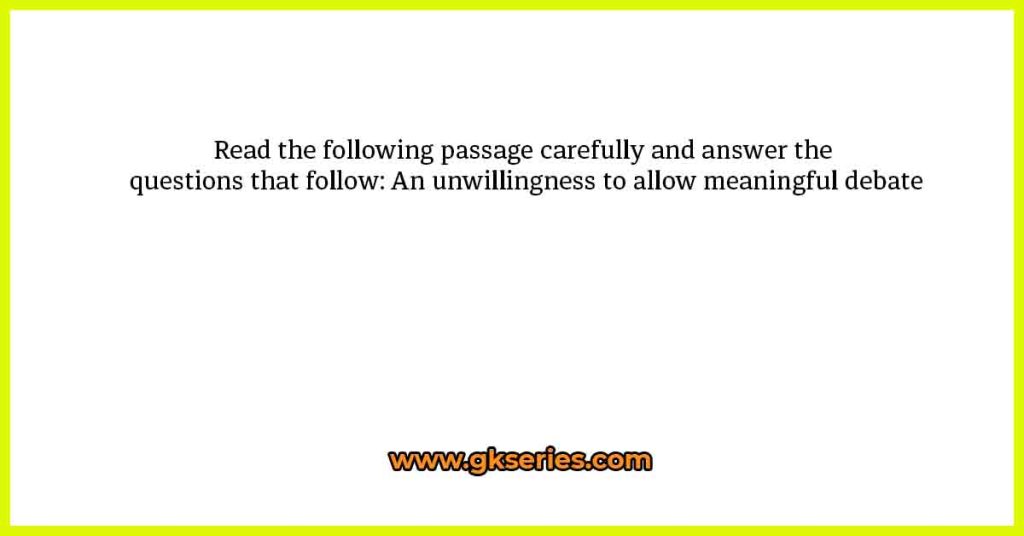Read the following passage carefully and answer the questions that follow: An unwillingness to allow meaningful debate

Directions: Read the following passage carefully and answer the questions that follow: An unwillingness to allow meaningful debate and invite wider consultation can undo even the progressive aspects of problematic legislation.
Ignoring protests, the Union government has managed to push through a Bill in Parliament to link electoral roll data with the Aadhaar ecosystem. On the face of it, the Bill’s objective
— to purify the rolls and weed out bogus voters
— may appear laudable, and the seeding of
Aadhaar data with voter identity particulars may seem to be a good way of achieving it. Indeed, this can also allow for remote voting, a measure that could help migrant voters. The four qualifying dates for revision of rolls will help in faster enrolment of those who turn 18. However, other aspects hold grave implications for electoral democracy. The Opposition underscored the possible disenfranchisement of legitimate voters unwilling or unable to submit Aadhaar details, the possible violation of privacy, and the possibility that demographic details may be misused for profiling of voters. Each is a valid concern that ought to be considered by a parliamentary committee. Union Law Minister KirenRijiju has said that the proposal has been unanimously approved by the Parliamentary Committee on Law and Justice. But, it is not clear if the specifics of the Bill had been discussed widely and public opinion sought.
There are indeed complaints that some electors may be registered in more than one constituency and that non-citizens have been enrolled, but these can be addressed by other identification processes. In fact, the Aadhaar database may be irrelevant to verify voter identity because, it is an identifier of residents and not citizens. And the complaints of wrongful enrolment have come up even against the unique identity number allotted to more than 90% of the population. Mr. Rijiju is confident that the Election Laws (Amendment) Bill satisfies the tests laid down by the Supreme Court — a permissible law, a legitimate state interest and proportionality. However, this has to be rigorously examined. Even though the Aadhaar requirement is said to be voluntary, in practice it can be made mandatory. The Bill saysthat,the election registration officer may require the submission of the Aadhaar number both for new enrolments and those already enrolled. The choice not to submit is linked to a “sufficient cause”, which will be separately prescribed. Whether the few permissible reasons not to intimate one’s Aadhaar number include an objection on principle is unknown. If an individual’s refusal to submit the detail is deemed unacceptable, it may result in loss of franchise. Therefore, the measure may fail the test of proportionality. If the Government really has no ulterior motive in the form of triggering mass deletions from the electoral rolls, it must invite public opinion and allow deeper parliamentary scrutiny before implementing the new provisions that now have the approval of both Houses of Parliament.
1) Which of the following is NOT one of the opposition party’s concerns about the Bill?
A. Linking electoral roll data with the Aadhaar may result in the loss of eligible voters who are unwilling or unable to provide Aadhaar details.
B. Linking electoral roll data to the Aadhaar ecosystem may impede remote voting, a measure that may be troublesome for migrant voters.
C. Linking election roll data to the Aadhaar ecosystem may result in privacy violations.
D. By linking electoral roll data to the Aadhaar ecosystem, there is a risk that demographic information may be misused for voter profiling.
E. All the above
2) What is the objective of the bill mentioned in the given passage?
A. to purify the rolls and get rid of bogus voters.
B. to help migrant workers.
C. to collect demographic details.
D. to allot unique identity number to the citizens.
E. None of these
3) What does the Bill say about the Aadhaar requirement?
A. The election registration officer may require the submission of the Aadhaar number both for new enrolments and those already enrolled.
B. It is mandatory to submit Aadhaar details to Mr. KirenRijiju.
C. The decision not to submit Aadhaar is related to a “sufficient cause,” which will be defined separately.
D. Both A and C
E. None of these
4) What must the government do if it does not wish to cause massive deletions from the electoral rolls?
A. Before implementing the new laws, the government must obtain public opinion and allow for greater parliamentary examination.
B. The government must provide accurate data on the beneficiaries and enable implementation of direct benefit transfer (DBT) programmes.
C. The government must improve disbursement systems and utilize its scarce development funds more effectively and efficiently.
D. Both A and C
E. All the above
5) Which of the following is/are FALSE according to the given passage?
A. The Election Laws (Amendment) bill allows for remote voting.
B. Union Law Minister KirenRijiju has said the proposal has been unanimously approved by the Parliamentary Committee on Law and Justice.
C. The Election Laws (Amendment) bill does not satisfy the tests laid down by the Supreme Court.
D. Remote voting is a measure that could help migrant voters.
E. None of these
6) What is the SYNONYM of the word ‘underscore’ given in the passage?
A. criticize
B. emphasize
C. exaggerate
D. compliment
E. admonish
7) What is the ANTONYM of the word ‘laudable’ given in the passage?
A. admirable
B. meritorious
C. guiltless
D. rigorous
E. deplorable